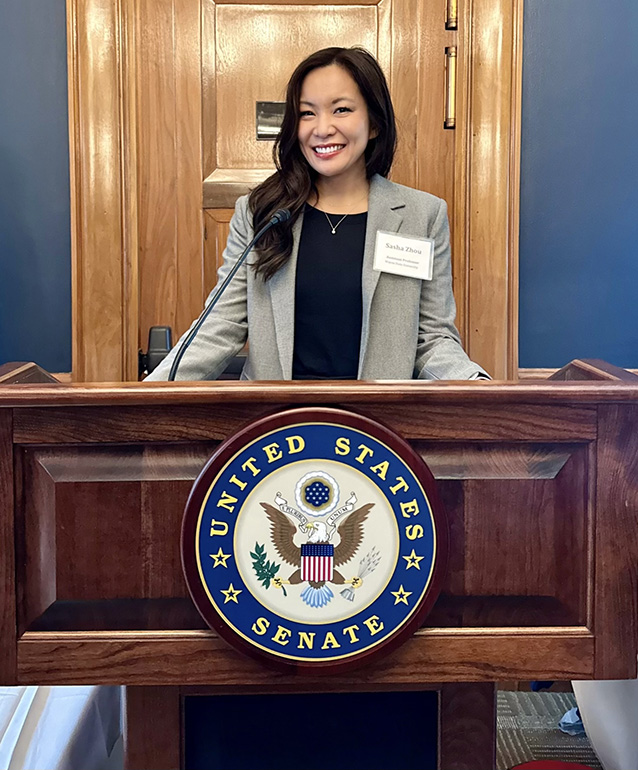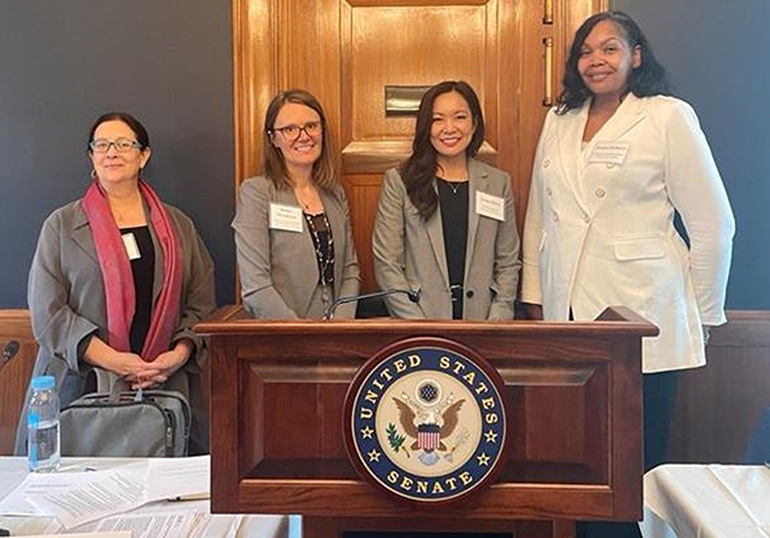
DETROIT – As part of efforts to address the growing student mental health crisis on college campuses, the American Council on Education (ACE) invited experts – including one from Wayne State University – to participate in a briefing on Capitol Hill on March 6.
Sasha Zhou, Ph.D., an assistant professor in the Department of Public Health in Wayne State University’s College of Liberal Arts and Sciences, provided an overview of the current data and trends regarding student mental health to an audience of nearly 100 congressional staffers at the Dirksen Senate Office Building.
“To be totally honest, I was pretty nervous for it,” Zhou said. “I’ve never talked to this audience before, but I felt like the reception was great. I just talked about how the data is pretty clear to show that we need more support.”
The panel included Connecticut Senator Chris Murphy (D), a member of the Health, Education, Labor, and Pensions Committee; Sonya Clyburn, director of the Counseling Center at Morgan State University; and Carlota Ocampo, provost at Trinity Washington University.
Zhou is a co-investigator of the Healthy Minds Network, one of the nation’s premier research organizations dedicated to improving the mental and emotional well-being of young people through innovative, multidisciplinary scholarship. The network consists of researchers from across the country, including those from the University of Michigan, University of California-Los Angeles and Boston University.
The panelists discussed multiple ways colleges and universities are tackling student mental health, such as expanding campus counseling services, like Wayne State’s Counseling and Psychological Services (CAPS), increasing telehealth services, implementing community partners, and utilizing crisis support lines. The discussion also touched on legislative proposals being advanced by ACE to expand federal support and increase access to telehealth and other services.
But much more federal aid is greatly needed.

“Right now, most of the funding goes to K through 12, and we actually have very, very little funding that goes to the higher ed space,” Zhou said. “Last year, through the Garrett Lee Smith grant, the government only funded 22 colleges on an average of about $100,000, which is just not enough for what we need in higher ed.”
ACE has proposed the creation of a federal program with $13.8 billion of funding over 10 years to address the growing mental health crisis among higher education students. The proposed U.S. Department of Education program would support the services, training and research at colleges and universities that are necessary to alleviate and prevent urgent student mental health challenges, including anxiety, depression and suicide.
Zhou, who was born in China and raised in suburban Cleveland, noted the importance of reaching college students experiencing mental health symptoms for the first time as a way to truly serve as a catalyst for long-term success and well-being.
“I talk a lot about prevention because obviously right now counseling is a really important part of the equation, but it’s just not enough,” she said. “We need to think about a public health approach to mental health and higher education, which means increasing both traditional mental health services and prevention efforts.”
According to Zhou, the last year of data shows that 41% of students nationally met the criteria for clinically significant depression, 36% had clinically significant anxiety symptoms and 14% seriously considered suicide.
“This is compared to 2007 numbers, where 6% of students reported seriously considering suicide,” she said, “which is less than half of what we see in this most recent academic year.”
Patricia Wren, Ph.D., chair of Wayne State’s Department of Public Health, said public health is about more than pandemics.
“Our students are training to be the next generation of leaders in research and action to support the mental, physical and social well-being of our population,” said Wren. “Dr. Zhou shows how public health research can inform public policy and best practices in higher education.”
While COVID has significantly affected the mental health of adults and children, Zhou said there are other geopolitical and sociopolitical explanations to the pre-pandemic rise in anxiety and depression.
“If you think about the lives of 18- to 25-year-olds, they have some reasons to be fearful and anxious,” she said. “These are kids born around 9/11, many of whom have climate change and eco-anxiety. They are exposed to school shootings on a regular basis and, of course, then the pandemic.”
So, what was Zhou’s takeaway from her experience in Washington, D.C.?
“A lot of folks actually don’t know much about the current situation in mental health and higher ed,” she said. “They don’t know that it’s a national issue and just how serious it is and how this is a very critical time for investment.”
